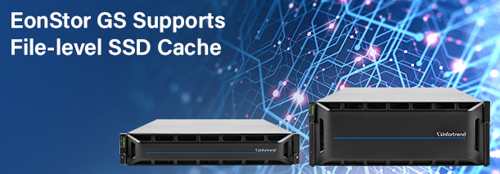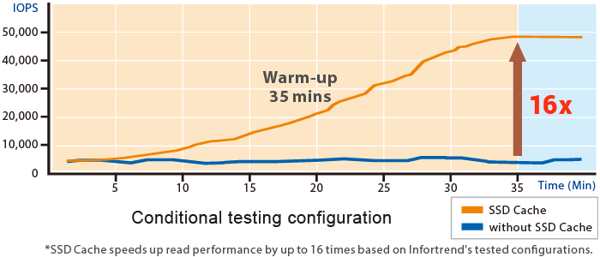Infortrend Adds SSD Cache Into EonStor GS Unified Storage Systems
To accelerate file access performance in enterprise applications characterized by high number of random file access operations
This is a Press Release edited by StorageNewsletter.com on July 2, 2021 at 2:33 pmInfortrend Technology, Inc. adds SSD cache into EonStor GS unified storage to accelerate file access performance in enterprise applications characterized by high number of random file access operations.
EonStor GS is an enterprise unified storage enabling SMBs and large enterprises to manage file-based (NAS) and block-based (SAN) storage in a single device. With redundant controller design, it ensures reliability and improves overall performance. It supports multiple RAID HDD protection levels and petabyte-level storage capacity, so enterprises won’t have to worry about insufficient storage capacity and data loss. These appliances supports SSDs acting as cache on its NAS storage service to improve file access performance. By caching frequently used data on a high-speed storage medium, subsequent client requests for accessing enterprise data can be served more quickly.
GS with integrated SSD cache is an optimal solution for applications involving random access behavior, such as file sharing, email, as well as media post-production editing. If several users simultaneously access files and the required data bits are not located in adjacent sectors, traditional mechanical HDDs cause a longer seek time, resulting in a higher I/O delay, which in turn reduces system performance and negatively effects user experience. Thanks to SSDs’ near-zero seek time advantage, GS’s SSD cache reduces I/O latency and improves IO/s performance. Algorithms intelligently predict and cache commonly used small blocks of data and metAdata: improving GS’s access performance to random access data.
“We added SSD cache to EonStor GS unified storage for accelerating file-level random access data. For general applications like office file sharing and emails, users can deploy one or two SSDs, while for media editing, which requires higher bandwidth, four or more SSDs are recommended,” said Frank Lee, senior director, product planning.
Video: EonStor GS SSD cache
















 Subscribe to our free daily newsletter
Subscribe to our free daily newsletter


